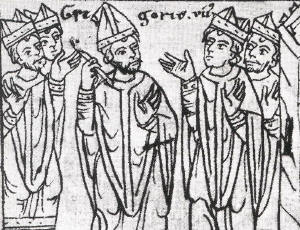Church reformers in the late 11th century sought to attack what they saw as "abuses, especially simony [paying for ecclesiastical office] and clerical marriage. Both practices were condemned by a Roman council held in 1074 early in the pontificate of Pope Gregory VII (1073 -1085)..
Those who have been advanced to any grade of holy orders, or to any office, through simony, that is, by the payment of money, shall hereafter have no right to officiate in the holy church.
 Those also who have secured churches by giving
money shall certainly be deprived of them. And in the future it shall be illegal
for anyone to buy or to sell [any ecclesiastical office, position, etc.].
Those also who have secured churches by giving
money shall certainly be deprived of them. And in the future it shall be illegal
for anyone to buy or to sell [any ecclesiastical office, position, etc.].Nor shall clergymen who are married say mass or serve the altar in any way. We decree also that if they refuse to obey our orders, or rather those of the holy fathers, the people shall refuse to receive their ministrations, in order that those who disregard the love of God and the dignity of their office may be brought to their senses through feeling the shame of the world and the reproof of the people.
Decree of Council at Rome 1074, [Mansi XX. P. 404], in Oliver J. Thatcher, and Edgar Holmes McNeal, eds., A Source Book for Medieval History, (New York: Scribners, 1905), pp. 134-135